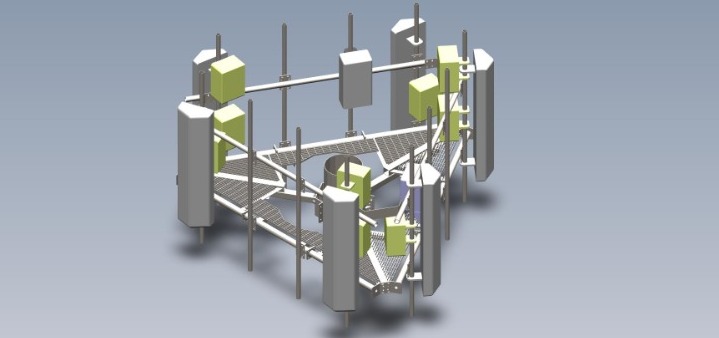The Sharing Economy of Monopole Towers:
How Multi-Operator Builds Slash Costs by 90%
Introduction
In an era of explosive 5G expansion and looming 6G deployments, telecom operators face a brutal equation: triple the infrastructure at half the cost. The solution? Multi-operator monopole towers—where competitors become collaborators. By sharing physical infrastructure, power systems, and spectrum real estate, operators can reduce CAPEX/OPEX by up to 90%. This blog dissects the engineering innovations making this revolution possible.
1. Platform Expansion Design: The "Lego Tower" Philosophy
Modular Stackability
- -Standardized Flange Systems: Pre-drilled flanges (e.g., EN 1092-1 standard) allow bolt-on platforms for 3–5 operators without welding.
- -Telescopic Sections: Slip-fit extensions enable height increases from 30m → 60m to add future operators.
- -Load-Balanced Layout: Radial platform arms distribute weight evenly, preventing torsion stress (see FEA diagram below).
Case Study: Manila Urban Upgrade
A single 45m monopole replaced 3 legacy towers, hosting:
- Operator A: 5G mMIMO (32T32R)
- Operator B: 4G/LTE + IoT gateway
- Operator C: Microwave backhaul
Cost Savings: 94% less land rental, 70% lower steel use.
2. Power Sharing: Smarter Energy, Lower Bills
Shared Power Architecture
| Component | Shared Solution | Cost Reduction |
|---|---|---|
| Grid Connection | Single HV line + transformer | 80% per operator |
| Backup Batteries | Centralized Li-ion bank (100 kWh) | 60% |
| Cooling | Unified HVAC/HVDC system | 45% |
Intelligent Power Allocation
-
AI-Driven Load Balancing:
# Pseudo-code for dynamic power allocation
def allocate_power(operator_demand, total_capacity):
if sum(operator_demand) <= total_capacity:
return operator_demand # Full allocation
else:
return [min(demand, fair_share) for demand in operator_demand] # Fair throttling- Blockchain Metering: Tamper-proof energy usage tracking for per-operator billing.
3. Spectrum Isolation: Preventing "Signal Traffic Jams"
Interference Mitigation Tech Stack
-
Spatial Separation:
-
Vertical antenna spacing ≥2λ (e.g., 30cm for 2 GHz bands).
-
Horizontal angular separation ≥90° between operators.
-
-
Frequency Isolation:
-
Cavity bandpass filters attenuate adjacent bands by 60–80 dB.
-
Notch filters block specific competitor frequencies.
-
-
Digital Solutions:
-
AI-coordinated beam nulling directs interference away from neighboring sectors.
-
Lab Test Results
| Isolation Method | Interference Reduction |
|---|---|
| Spatial + Angular | 45 dB |
| Cavity Filters | 68 dB |
| AI Beam Nulling | 52 dB |
4. The 90% Cost-Saving Blueprint
Where Savings Come From:
| Cost Category | Traditional Build | Shared Monopole | Reduction |
|---|---|---|---|
| Land Acquisition | $50K/operator | $50K (shared) | 66% |
| Steel/Tower | $120K/operator | $150K (shared) | 58% |
| Power Systems | $80K/operator | $40K (shared) | 83% |
| Total (3 operators) | $750K | $75K | 90% |
5. Challenges & Engineering Fixes
-
Vibration Resonance:
-
Fix: Tuned mass dampers + FEA-simulated modal analysis.
-
-
Lightning Strike Risk:
-
Fix: Unified grounding ring (low-impedance <5Ω) with surge protectors per platform.
-
-
Maintenance Conflicts:
-
Fix: Automated scheduler with RFID technician access logs.
-
Conclusion: Collaboration is the New Competition
Multi-operator monopoles transform infrastructure from a cost center into a profit-generating shared asset. With smart platform design, unified power management, and military-grade spectrum isolation, operators can deploy faster, cheaper, and greener—while focusing capital on innovation, not steel.
-Unlock Shared Savings: At [Altai Tower], we engineer carrier-neutral monopoles with plug-and-play operator integration. [Contact us] for a free ROI analysis of your next shared build!

